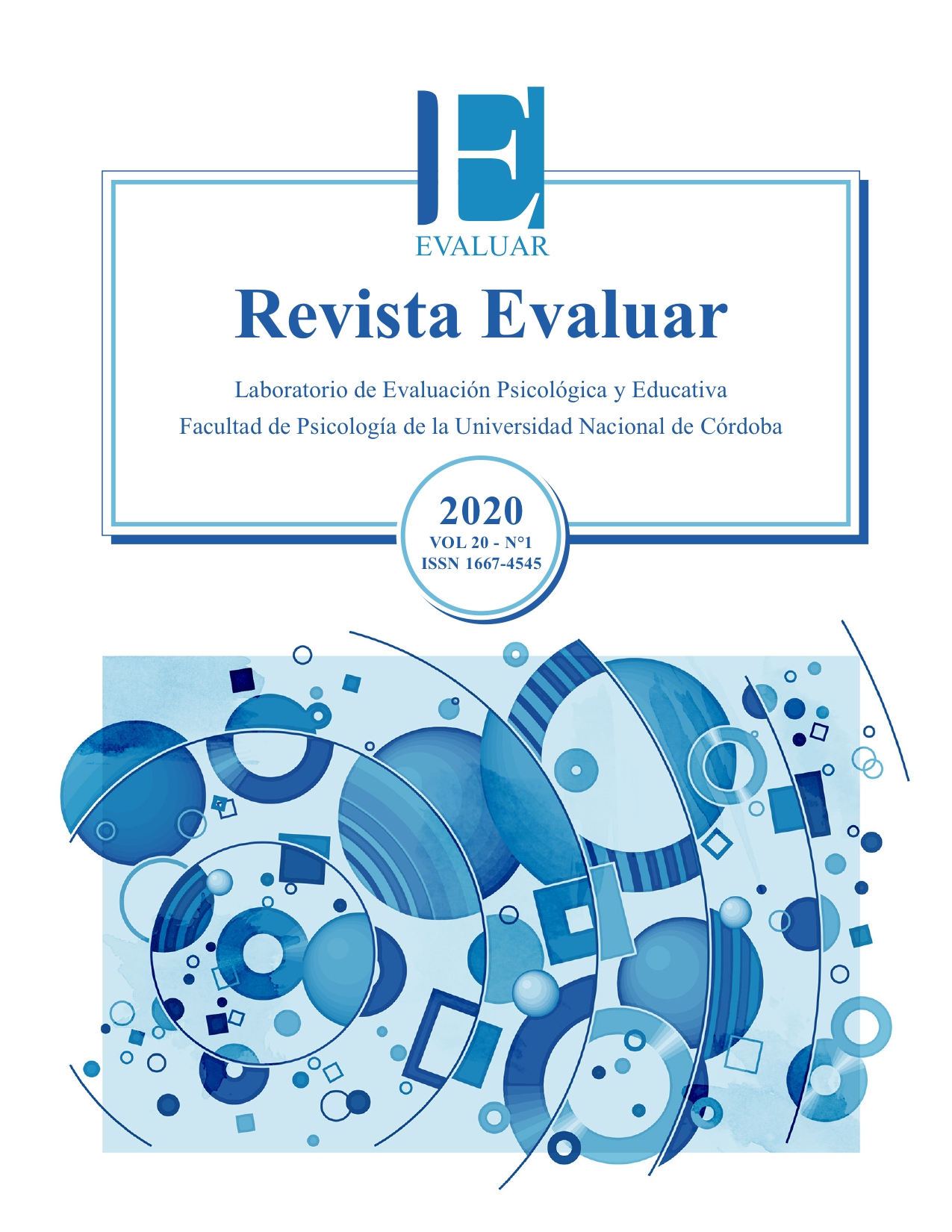Development of Instruments to Measure Attitudes towards the Trans Community: Preliminary Analysis
DOI:
https://doi.org/10.35670/1667-4545.v20.n1.28486Keywords:
transgender, transsexual, psychotherapy, attitudes, scale validationAbstract
The purpose of this study was to develop and preliminarily validate two instruments to measure attitudes of psychotherapists towards the trans community. The former instrument measures the attitudes of psychotherapists towards the transgender community and the latter, towards the transsexual community. The sample consisted of 131 participants recruited according to their availability. The results preliminarily confirmed that both scales have a one-dimensional structure. Cronbach’s alpha internal consistency index for the first scale was .75 and .85 for the second. There were no significant differences in attitudes towards the transgender and transsexual community between students and psychology professionals. We conclude that the health of trans people is a human and universal right, therefore, it is the responsibility of all psychotherapists to educate themselves about the issue and it is a debt of the educational institutions to integrate it into their curriculum.
Downloads
References
Ali, N., Fleisher, W., & Erickson, J. (2016). Psychiatrists’ and psychiatry residents’ attitudes toward transgender people. Academic Psychiatry, 40(2), 268-273. doi: 10.1007/s40596-015-0308-y
Asociación de Psicología de Puerto Rico. (2014). Estándares para el trabajo e intervención en comunidades lesbianas, gay, bisexuales e identidades trans (LGBT). San Juan, Puerto Rico: Autor.
Ato, M., López, J. J., & Benavente, A. (2013). Un sistema de clasificación de los diseños de investigación en psicología. Anales de Psicología, 29(3), 1038-1059. doi: 10.6018/analesps.29.3.178511
Bockting, W. O., Miner, M. H., Swinburne-Romine, R. E., Hamilton, A., & Coleman, E. (2013). Stigma, mental health, and resilience in an online sample of the US transgender population. American Journal of Public Health, 103(5), 943-951. doi: 10.2105/AJPH.2013.301241
Carrera-Fernández, M. V., Lameiras-Fernández, M., Rodríguez-Castro, Y., & Vallejo-Medina, P. (2014). Spanish adolescents’ attitudes toward transpeople: Proposal
and validation of a short form of the Genderism and Transphobia Scale. The Journal of Sex Research, 51(6), 654-666. doi: 10.1080/00224499.2013.773577
Coleman, E., Bockting, W., Botzer, M., Cohen-Kettenis, P., DeCuypere, G., Feldman, J., … Zucker, K. (2012). Standards of care for the health of transsexual, transgender and gender-nonconforming people. International Journal of Transgenderism, 13(4), 165-232. doi: 10.1080/15532739.2011.700873
Esteban-Reyes, C., Ortiz-Mendoza, C. M., Rivera-Morales, N., Purcell-Baerga, P., & Ruiz-Mojica, G. (2016). La educación del género en peligro de extinción: Preparación de psicoterapeutas clínicos en Puerto Rico. Revista Puertorriqueña de Psicología, 27(1), 80-93. Recuperado de http://www.ojs.repsasppr.net/index.php/reps/index
Ferré, L. (1995). Selection of components in principal component analysis: A comparison of methods. Computational Statistics & Data Analysis, 19(6), 669-682. doi: 10.1016/0167-9473(94)00020-j
Field, A. P. (2013). Discovering statistics using IBM SPSS statistics (4ª ed.). London, England: SAGE.
Francia-Martínez, M., Esteban, C., & Lespier, Z. (2017). Actitudes, conocimiento y distancia social de psicoterapeutas con la comunidad transgénero y transexual. Revista Puertorriqueña de Psicología, 28(1), 98-113. Recuperado de http://www.ojs.repsasppr.net/index.php/reps
Grant, J. M., Mottet, L. A., Tanis, J., Harrison, J. L., Herman, J., & Keisling, M. (2011). Injustice at every turn: A report of the National Transgender Discrimination Survey. Recuperado de https://transequality.org
Hatcher, L. (1994). A step-by-step approach to using the SAS system for factor analysis and structural equation modeling. Cary, NC: SAS Institute.
Hill, D. B., & Willoughby, B. L. B. (2005). The development and validation of the Genderism and Transphobia Scale. Sex Roles, 53(7-8), 531-544. doi: 10.1007/s11199-005-7140-x
IBM Corp. (2016). IBM SPSS Statistics for Windows (version 24.0). [software de cómputo] Armonk, NY: Autor.
Jorge, J. C. (2016). El nombrar clínico: La disforia de género. Boletín Diversidad, 7(1), 6-9. Recuperado de https://www.boletindiversidad.org
Jung, S. (2013). Exploratory factor analysis with small sample sizes: A comparison of three approaches. Behavioural Processes, 97(1), 90-95. doi: 10.1016/j.beproc.2012.11.016
Kline, P. (2000). The Handbook of Psychological Testing (2ª ed.). New York, NY: Routledge. LGBT Advisory Committee & San Francisco Human Rights Commission. (2011). Bisexual invisibility: Impacts and recommendations. San Francisco, CA: San Francisco Human Rights Commission. Recuperado de https://sf-hrc.org
Lilienfeld, S. O., Lynn, S. J., Namy, L. L., & Woolf, N. J. (2011). Psicología: Una introducción. Madrid, España: Pearson Education.
Lloret-Segura, S., Ferreres-Traver, A., Hernández-Baeza, A., & Tomás-Marco, I. (2014). El análisis factorial exploratorio de los ítems: Una guía práctica, revisada y actualizada. Anales de Psicología, 30(3), 1151-1169. doi: 10.6018/analesps.30.3.199361
Macía-Sepúlveda, F. (2010). Validez de los tests y el análisis factorial: Nociones generales. Ciencia & Trabajo, 12(35), 276-280. Recuperado de https://dialnet.unirioja.es/servlet/articulo?codigo=3218921
McCann, E., & Sharek, D. (2014). Survey of lesbian, gay, bisexual and transgender people’s experiences of mental health services in Ireland. International Journal of Mental Health Nursing, 23(2), 118-127. doi: 10.1111/inm.12018
Montero, I., & León, O. G. (2007). A guide for naming research studies in psychology. International Journal of Clinical and Health Psychology, 7(3), 847-862. Recuperado de https://aepc.es/ijchp/busca.php
Norton, A. T., & Herek, G. M. (2013). Heterosexuals’ attitudes toward transgender people: Findings from a national probability sample of U.S. adults. Sex Roles, 68, 738-753. doi: 10.1007/s11199-011-0110-6
Páez, J., Hevia, G., Pesci, F., & Rabbia, H. H. (2015). Construcción y validación de una escala de actitudes negativas hacia personas trans. Revista de Psicología, 33(1), 151-188. Recuperado de http://revistas.pucp.edu.pe/index.php/psicologia
Ramos-Pibernus, A. G. (2016). Hombres trans en Puerto Rico: Una comunidad escondida. Boletín Diversidad, 7(1), 10-11. Recuperado de http://www.boletindiversidad.org
Ramos-Pibernus, A. G., Rodríguez-Madera, S. L., Padilla, M., Varas-Díaz, N., & Vargas-Molina, R. (2016). Intersections and evolution of ‘Butch-trans’ categories in Puerto Rico: Needs and barriers of an invisible population. Global Public Health, 11(7-8), 966-980. doi: 10.1080/17441692.2016.1180703
Riggs, D. W., & Sion, R. (2016). Gender differences in cisgender psychologists’ and trainees’ attitudes toward transgender people. Psychology of Men & Masculinities, 18(2), 187-190. doi: 10.1037/men0000047
Rodríguez-Madera, S. L. (2012). TRANS-acciones de la carne: Criminalización de mujeres trans puertorriqueñas que ejercen el trabajo sexual. En S. M. Serrano-Rivera (Ed.), Registros Criminológicos Contemporáneos (pp. 107-150). San Juan, Puerto Rico: Situm.
Rodríguez-Madera, S., Ramos-Pibernus, A., Padilla, M., & Varas-Díaz, N. (2015). Radiografías de las comunidades trans en Puerto Rico: Visibilizando femineidades y masculinidades alternas. En M. Vázquez-Rivera, A. Martínez-Taboas, M. Francia-Martínez & J. Toro-Alfonso (Eds.), LGBT 101: Una mirada introductoria al colectivo (pp. 315-342). Hato Rey, Puerto Rico: Publicaciones Puertorriqueñas.
Rodríguez-Madera, S., & Toro-Alfonso, J. (2002). Ser o no ser: La transgresión del género como objeto de estudio de la psicología. Avances en Psicología Clínica Latinoamericana, 22, 63-78.
Rodríguez-Madera, S., & Toro-Alfonso, J. (2003). La comunidad de la cual no hablamos: Vulnerabilidad social, conductas de riesgo y VIH/SIDA en la comunidad de transgénero en Puerto Rico. Revista Puertorriqueña de Psicología, 14(1), 7-40. Recuperado de http://www.ojs.repsasppr.net/index.php/reps/index
Schmitt, T. A. (2011). Current methodological considerations in exploratory and confirmatory factor analysis. Journal of Psychoeducational Assessment, 29(4), 304-321. doi: 10.1177/0734282911406653
Stangor, C. (2012). Social Psychology Principles. Recuperado de https://opentextbc.ca/socialpsychology/#-main
Streiner, D. L. (1994). Figuring out factors: The use and misuse of factor analysis. The Canadian Journal of Psychiatry, 39(3), 135-140. doi: 10.1177/070674379403900303
Taylor, R. (1990). Interpretation of the correlation coefficient: A basic review. Journal of Diagnostic Medical Sonography, 6(1), 35-39. doi: 10.1177/875647939000600106
Walzer, A. (2015). School psychologists’ knowledge of and attitudes towards transgender students (Tesis de maestría). Recuperado de https://rdw.rowan.edu/etd
Wilson, F. R., Pan, W., & Schumsky, D. A. (2012). Recalculation of the critical values for Lawshe’s content validity ratio. Measurement and Evaluation in Counseling and Development, 45(3), 197-210. doi: 10.1177/0748175612440286
Downloads
Published
Versions
- 2020-07-04 (4)
- 2020-07-04 (2)
- 2020-05-05 (1)
How to Cite
Issue
Section
License

This work is licensed under a Creative Commons Attribution 4.0 International License.
Revista Evaluar aplica la Licencia Internacional de Atribuciones Comunes Creativas (Creative Commons Attribution License, CCAL). Bajo esta licencia, los autores retienen la propiedad de copyright de los artículos pero permiten que, sin que medie permiso de autor o editor, cualquier persona descargue y distribuya los artículos publicados en Evaluar. La única condición es que siempre y en todos los casos se cite a los autores y a la fuente original de publicación (i.e. Evaluar). El envío de artículos a Evaluar y la lectura de los mismos es totalmente gratuito.




_(3).jpg)



.jpg)



